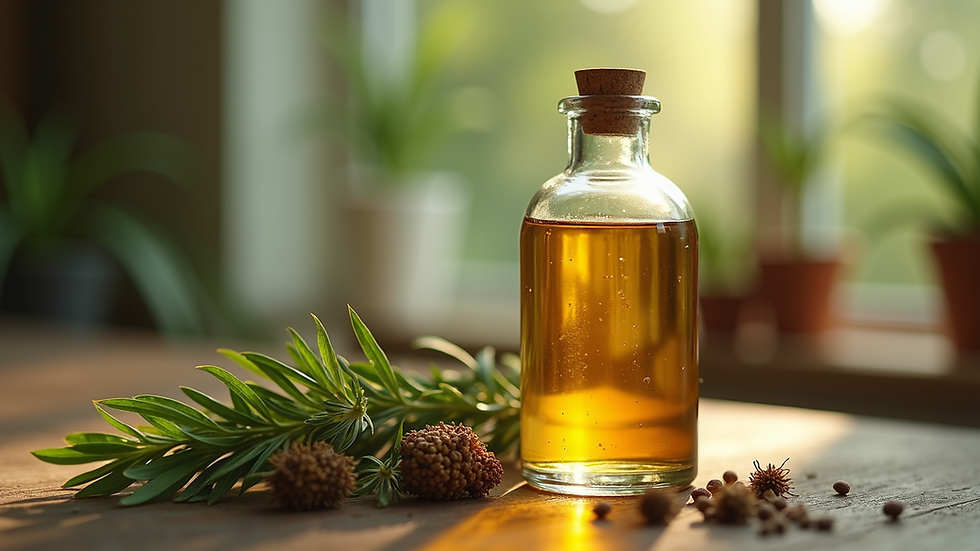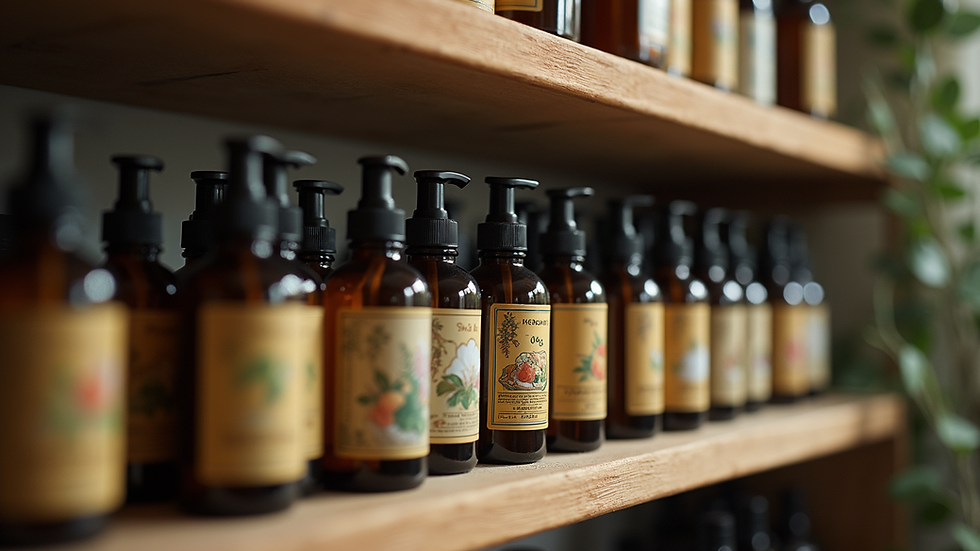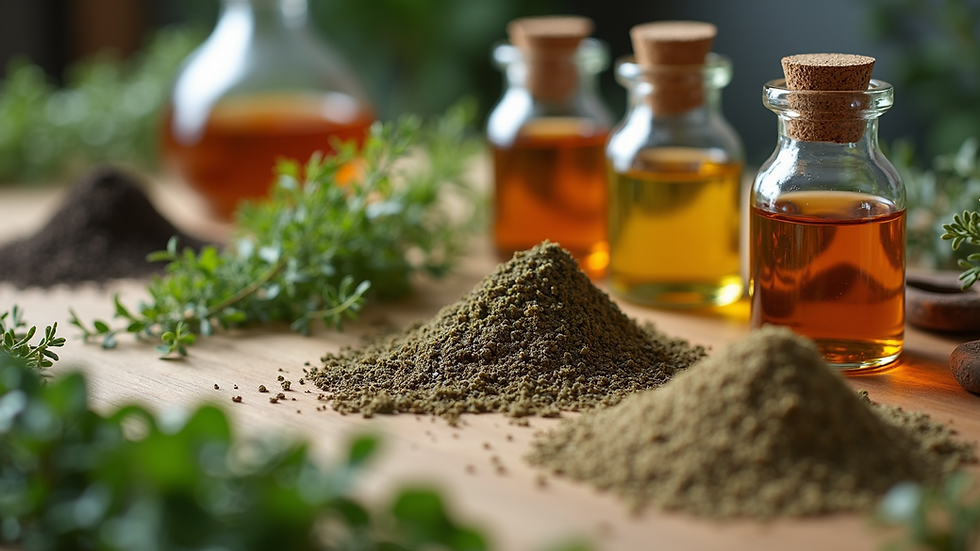Mastering the Use of Herbal Tinctures
- Crystal Maceira

- Jul 24, 2025
- 4 min read
Herbal tinctures have gained popularity in recent years as a convenient and effective way to consume the benefits of herbs. These concentrated extracts can support various health goals, from boosting immunity to aiding digestion. In this blog post, we will explore the ins and outs of using herbal tinctures, their preparation, benefits, and practical tips for incorporating them into your health regime.
Using Herbal Tinctures
Herbal tinctures are made by soaking herbs in alcohol or another solvent to extract their active compounds. This process can produce a highly concentrated liquid that retains the beneficial properties of the herbs. Users appreciate tinctures for their ease of use and rapid absorption. In comparison to other forms of herbal medicine, such as teas or capsules, tinctures are often more potent and require smaller doses.
Tinctures can be made from a wide variety of herbs, including echinacea, ginseng, valerian, and many others. This versatility means there's likely a tincture to support almost any health need. While they can provide numerous benefits, it's essential to understand how to use tinctures effectively to maximize their potential.
Benefits of Herbal Tinctures
Herbal tinctures offer numerous benefits that can enhance your wellness routine. Here are some key advantages:
Fast Absorption: Since tinctures are absorbed quickly into the bloodstream, the effects can be felt shortly after consumption. This rapid absorption may help with acute conditions, such as headaches or stress.
Easy Dosing: With tinctures, you can easily adjust your dosage. Most tinctures come with a dropper, allowing you to measure exact quantities.
Long Shelf Life: Tinctures are stable and can last for years if stored properly. Unlike dried herbs or teas, tinctures do not lose potency quickly.
Concentrated Form: Tinctures offer the benefits of the herbs in a concentrated form. You need only a few drops to receive the therapeutic effects.
Versatile Use: They can be taken directly or mixed with water, juice, or tea, making it easy to incorporate them into your daily routine.
While the benefits are numerous, understanding the proper use and dosage of tinctures is crucial for their effectiveness.

How Many Drops of a Tincture Should I Use?
Determining the right dosage of a tincture can vary based on the individual, the specific herb, and the desired outcome. While some people may require only a few drops, others may need significantly more. A standard guideline is to start with 1 to 3 dropperfuls (approximately 30-90 drops) per day, but this can vary.
It is always best to start low and gradually increase the dosage while monitoring your body's response. Our tinctures are a little more potent, so I suggest 6-20 drops to start, and then increase from there. For specific conditions, refer to the product label or consult an herbalist for tailored advice. Consider the following factors when determining your dosage:
Body Weight and Size: Individuals with larger body weights may require higher dosages.
Specific Health Concerns: Some conditions may necessitate a more substantial dose.
Herb Potency: Different herbs may have varying strengths, requiring adjustments in dosage.
Always listen to your body and make adjustments as needed.

Popular Types of Herbal Tinctures
With countless herbs offering unique benefits, here are some popular tinctures you might consider:
Echinacea: Commonly used to support the immune system, echinacea tincture is popular during cold and flu season. Research suggests it can help reduce the duration and severity of respiratory infections.
Ashwagandha: This adaptogenic herb is known for its ability to help the body manage stress. Ashwagandha tincture may promote relaxation and improve mood.
Ginger: Ginger tincture is often used to support digestion and help relieve nausea. Its anti-inflammatory properties can also aid in reducing discomfort.
Valerian: Known for its calming effects, valerian tincture is commonly used as a natural remedy for sleep disturbances and anxiety.
Milk Thistle: Often taken to support liver health, milk thistle tincture may help detoxify the body and protect liver cells. If taken consistently for four months, it can regenerate the liver by up to 60%!
Before starting any tincture, consult with a healthcare provider or herbalist to ensure it aligns with your health needs.

Practical Tips for Using Herbal Tinctures
Incorporating tinctures into your health routine can be simple and effective if done correctly. Here are some practical tips to maximize their benefits:
Read Labels Carefully: Always check the concentration and ingredients on the label. A higher concentration may require a smaller dose.
Store Properly: Keep tinctures in a cool, dark places, such as a pantry or cupboard, to maintain their potency.
Mix with a Beverage: If you find the taste of some tinctures unpalatable, feel free to mix them with a little water or juice.
Consistency is Key: For best results, take tinctures consistently. Daily use may be more beneficial than sporadic doses. Dr. John R. Christopher suggested taking most herbs six days on, one day off.
Monitor Effects: Pay attention to how your body responds. If you experience any adverse effects, discontinue use and consult a professional.
Incorporating tinctures into your daily routine doesn’t have to be complicated. By understanding how to use tinctures and following these tips, you can maximize their potential for enhancing your wellness.
The Future of Herbal Tinctures
As interest in plant-based remedies continues to grow, the future of herbal tinctures looks promising. More people are seeking natural alternatives for health and wellness, and tinctures provide an accessible and effective option.
Increasing scientific research into the benefits of herbal medicines may validate many traditional practices and provide a greater understanding of their mechanisms. As knowledge about herbs expands, consumers will likely have access to even more personalized and targeted herbal products.
In conclusion, mastering the use of herbal tinctures can significantly enhance your wellness journey. By understanding the various types available, their benefits, and how to integrate them into your routine, you can empower yourself to make informed health choices. If you are curious about how to use tinctures effectively, consider exploring resources that guide you in selecting the best tinctures for your needs. Remember to always consult with a professional, like me, if you're unsure, and embrace the journey into herbal healing. Good Health to You!







Comments